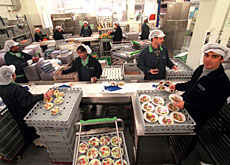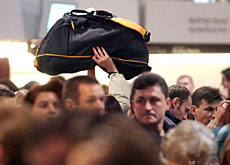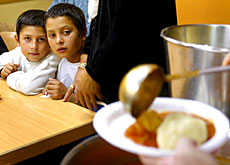Asylum seekers should be allowed to work

Zurich's city council has called for an urgent rethink of Switzerland's asylum laws, and put forward ten proposals including allowing asylum seekers to work.
It said that the present conditions endured by asylum seekers in Switzerland were “nothing more than an invitation towards petty crime”.
The move comes at a time when the German-speaking cantons are tending towards tougher measures on asylum seekers.
Zurich, Switzerland’s largest city, has demanded an end to “the stigmatisation of asylum seekers and… the pursuit of a policy that creates an environment that encourages criminality”.
“It’s the same people who forbid asylum seekers from working who also reproach them for being lazy,” said the city council in a statement.
The comment was directly aimed at the Zurich branch of the rightwing Swiss People’s Party, which two weeks ago publicly denounced foreigners for not working.
The People’s Party was also criticised by the head of the anti-racism commission, Georg Kreis, who called its comments “false and vexing”.
Asylum policy
Zurich’s mainly leftwing city council – comprised of four Social Democrats, one Green Party member, three Radicals and a magistrate with no political affiliation – is scathing of Switzerland’s asylum policy.
“It’s above all the towns and communes who live with the social and financial consequences of an erroneous asylum policy,” wrote the city councillors.
Zurich lambasted the recent revision of asylum rules, saying the measures were aimed at discouraging asylum seekers from coming to Switzerland.
It said that not only had Switzerland severely tightened its entry requirements, but that the standard of living of foreigners was also “barely acceptable”.
Zurich’s parliament singled out for particular criticism the lack of space in accommodation centres and the ban, in some cantons, on foreigners working for 12 months – even though nationwide it has been reduced to three months.
This meant asylum seekers were generally left to their own devices during the day, and they tended to gravitate towards neighbouring towns, said the statement.
Petty crime
But with only SFr3 a day in pocket money, this was “nothing more than an invitation towards petty crime,” said the city council. It added that it was surprised that so few asylum seekers were involved in crime given the circumstances.
The city authorities concluded that in the realm of policy towards foreigners, Switzerland was now in the same situation as it had been with its drug policy at the beginning of the 1990s.
“The towns and the communes have to live with the consequences of the decision, whereas the country and the cantons keep passing the buck back to each other,” said the statement.
For this reason, the city parliament had decided to present its own proposals to allow Switzerland to deal “reasonably and humanely” with the rising tide of migration. These measures could benefit everyone, it added.
Ten rules
Entitled “Ten rules for a new Swiss asylum policy”, the proposals start with the right or even the obligation for asylum seekers to work in order to finance themselves, and the right to education for young people.
It goes on to advocate that people in asylum centres should be able to organise their living conditions themselves and provide each other with a mutually supportive network.
Zurich is also in favour of Switzerland joining the European Union’s Schengen and Dublin agreements – governing the movement of people and asylum seekers – as quickly as possible.
Decisions on asylum should be made within six months, and asylum seekers known to be criminals should be immediately deported, it added.
It is also demanding that the federal government and the cantons assume responsibility for the costs borne by local communities and to make sure that these costs are calculated in a realistic way.
Reservations
Jörg Frieden, vice-director of the federal refugee office, welcomes Zurich city council’s proposal in that it opens up a broader discussion on asylum policy but has his reservations.
He says that Zurich city council will first have to sort out any differences with Zurich canton before it can start discussions with the government.
Frieden, also said that some of the suggestions were concentrating on easy targets. He affirmed that the majority of the asylum applications were dealt with in six months and that it was only the more difficult cases that took longer.
“In a sense they just chose the areas which are easy to deal with politically instead of the hard facts,” Frieden, told swissinfo.
He dismissed the city council’s claims that the low amount of money asylum seekers were given was tempting them into crime.
“The question is, do people have perspectives or not. Studies have shown that what matters is not level of income or pocket money but the migration perspectives a person has to establish themselves in this country,” said Frieden.
“Marginality is linked to fact that choice to come to Switzerland does not always correspond to expectations. In that area, I think the analysis is pretty naïve and fill of wishful thinking,” he added.
Opposition
Reinhard Wegelin, secretary of the Zurich city people’s party, said that he was glad that the city council had “woken up” to the asylum problem.
But he said that he did not agree that asylum seekers should be allowed to work.
“That’s the only way we can make Switzerland less attractive as a destination [for asylum seekers],” Wegelin told swissinfo.
He said that the Zurich city council should rather take its arguments to a national level.
Wegelin added that Zurich city council should be obliged to start a discussion with other city councils on how to add “pertinent” measures to the asylum law.
Worries
But referring to the tough new asylum proposal by the rightwing People’s Party, which was narrowly rejected in a nationwide vote last November, the city said that Switzerland was in an “emergency situation”.
“The rightly rejected initiative has not only made the debate around these questions much harsher but has also led to an essentially nasty tone and content [in these debates].”
Zurich has now added its voice to that of the Federal Commission for Foreigners, which said in mid-January that it was worried about the level of the debate in political discussions about foreigners.
Sociologist Kurt Imhof says “anti-foreigner” attitudes tend to increase before elections – the next is due in October – and in times of uncertainty.
“In periods of crisis, tolerance reduces; in periods of confidence… the topic of foreigners disappears,” he told swissinfo.
Simplistic solutions
Imhof said that political parties, such as the People’s Party, tended to favour simplistic solutions. “The black or white solutions are successful in a society that has totally lost its sense of direction.”
The position taken by Switzerland’s largest city is in sharp contrast to recent statements made by cantons in the German-speaking part of the country.
Aargau, Lucerne and St Gallen have written to the justice ministry calling for tougher measures on asylum.
Aargau has proposed a ban on mobile phones for asylum seekers suspected of being involved with drug trafficking. Lucerne is studying ways of limiting the freedom of movement of asylum seekers who are criminals or “anti-social”.
But on a cantonal level, Zurich is not far behind its neighbours. Rita Fuhrer, who is in charge of police matters for the canton and is a member of the People’s Party, has given her approval to an increased surveillance of asylum seekers’ correspondence and payments.
On Thursday, a federal parliamentary commission charged with examining the asylum laws recommended that they be tightened to deal alleged abuses of the system.
swissinfo, Ariane Gigon-Bormann in Zurich (translation: Isobel Johnson)
In 2001, there were 1.5 million foreigners living in Switzerland – 21.2% of the population.
On 24 November 2002, the People’s Party initiative “against abuses in the right to asylum” was rejected by a 4,208 majority, despite being accepted by a majority of the cantons.
Since then the cantons of Aargau, Lucerne and St Gallen have written to the state to demand a toughening of the asylum laws.

In compliance with the JTI standards
More: SWI swissinfo.ch certified by the Journalism Trust Initiative



You can find an overview of ongoing debates with our journalists here. Please join us!
If you want to start a conversation about a topic raised in this article or want to report factual errors, email us at english@swissinfo.ch.